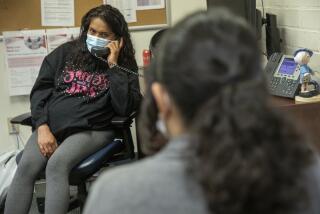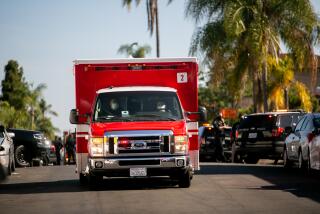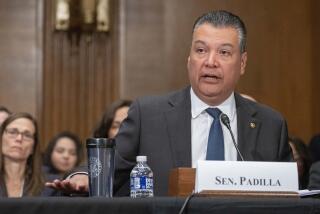Tough call on health info
- Share via
Cellphone services are hot right now, with lots of companies trying to sell you games, music and even live TV. But those are just for fun.
MyRapidMD has a cellphone product that could make the difference, the company says, between life and death.
“Could your phone save your life?” MyRapidMD asks at the top of its home page.
The product is a digital, cellphone version of the old-fashioned emergency information bracelet.
“We like to say it’s a medical bracelet on steroids,” said Damien Vallernaud, chief operating officer of MyRapidMD.
Subscribers to the service, who pay about $20 initially and then $6 a year for renewal, get their emergency medical information -- including allergies, current prescriptions, blood type, personal identification and more -- placed on their cellphones.
A sticker on the phone identifies it as MyRapidMD- equipped. To retrieve the information in an emergency, first responders click on a medical symbol on the screen and the info pops up. If the phone has been damaged, the info can be accessed with a call to a number on the sticker.
At least that’s the plan.
But it’s probably not the reality in Los Angeles, according to the Los Angeles Fire Department, which provides emergency medical services in the city.
“It is not our practice to look at someone’s cellphone,” said Capt. Armando Hogan, a spokesman for the department.
This isn’t the first time the department has had to deal with the issue.
About three years ago, spam e-mails urged people to put emergency info on their mobile phone address books under “I” for ICE, which stood for In Case of Emergency.
It was free, and the idea became so popular that the Fire Department put a warning on its website.
“It is obviously an idea that gives people peace of mind,” the department said, “yet should not be relied upon as a sole source for personal identification or emergency contacts.”
It continued: “ICE is not something that paramedics rush to look for the instant they arrive at an emergency.”
Even if they did, it could be more trouble than it’s worth. Just think how long it takes you to use the features on an unfamiliar cellphone.
“With so many types and brands of wireless phones,” the department said, “it can take precious minutes to learn how to access a phone’s directory.”
Vallernaud said Marina del Rey-based MyRapidMD was aware of the problem. The company has to persuade first responders across the country to check cellphones as a matter of policy.
“We have to get it in training manuals,” Vallernaud said.
MyRapidMD has created an advisory board made up of first responders from various locales. When people who work in the field present it, the concept gets a much friendlier reception.
“Then they let you right in the door,” Vallernaud said.
In the meantime, medical bracelets, necklaces and other low-tech delivery systems for emergency information retain their retro appeal. Otherwise, relying only on MyRapidMD info on your cellphone might be high-tech to die for.
--
More to Read
Sign up for Essential California
The most important California stories and recommendations in your inbox every morning.
You may occasionally receive promotional content from the Los Angeles Times.














